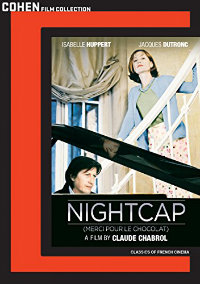Disc Reviews
Nightcap | Blu-ray Review
 Coming to Blu-ray for the first time from the Cohen Media Group, Claude Chabrol’s late career thriller, Nightcap (better known by its French title, Merci Pour Le Chocolat) is often lumped into conversation as merely one of the seven films the director made with actress Isabelle Huppert. While it is certainly outshined by some of their finer achievements together (particularly The Story of Women and La Ceremonie), it stands firmly on its own as an odd exercise that’s more character study than murder mystery. Chabrol seems amused at the convention and convenience of the narrative, supplied by Charlotte Armstrong’s nonsensically titled 1948 novel The Chocolate Cobweb. Armstrong was in high regard in the 1950’s (her novel Don’t Bother to Knock was turned into a very strange Marilyn Monroe vehicle in 1952), and Chabrol seems keen on retaining the rather deliberate ambience from a tradition of genre gone by.
Coming to Blu-ray for the first time from the Cohen Media Group, Claude Chabrol’s late career thriller, Nightcap (better known by its French title, Merci Pour Le Chocolat) is often lumped into conversation as merely one of the seven films the director made with actress Isabelle Huppert. While it is certainly outshined by some of their finer achievements together (particularly The Story of Women and La Ceremonie), it stands firmly on its own as an odd exercise that’s more character study than murder mystery. Chabrol seems amused at the convention and convenience of the narrative, supplied by Charlotte Armstrong’s nonsensically titled 1948 novel The Chocolate Cobweb. Armstrong was in high regard in the 1950’s (her novel Don’t Bother to Knock was turned into a very strange Marilyn Monroe vehicle in 1952), and Chabrol seems keen on retaining the rather deliberate ambience from a tradition of genre gone by.
Chabrol, often referred to as the French Hitchcock, often adapted the works of murder mystery writers, and he had used Armstrong’s The Balloon Man for an earlier film, 1970’s The Breach. The narrative is glaringly simple. The heiress of a Swiss Chocolate empire, Marie-Claire “Mika” Muller (Huppert) is about to become the second wife of a prominent pianist, Andre Polonski (Jacques Dutronc). Their union is a demure civil ceremony and the small cadre of guests whisper bits of gossip about how it compares to the first, extravagant wedding of Polonski’s first wife, who died in a terrible car accident hopped up on booze and prescription pills. Polonski’s son, Guillaume (Rodolphe Pauly), is a quiet reserved type, not musically inclined in the least, which rather marks him as a disappointment. Yet, he seems affectionate with Mika. Then, their comfortable unit is disturbed by an interloper. An aspiring pianist, Jeanne Pollet (Anna Mougalalis) learns from her mother (Brigitte Catillon) that on the day of her birth, Polonski had been mistakenly told that she was his child and not Guillaume. Jeanne uses this as an excuse to approach Polonski at his home, who seems enthused to find such a willing, beautiful pupil, especially one that actually looks like his deceased first wife and is passionate about music.
It’s evident nearly immediately that something isn’t quite right about Mika. She’s an overly helpful blank slate, mostly consumed with administering nightly doses of her famed hot cocoa to her stepson. To a guest at her wedding ceremony she responds to a caring elder, “I’m no one’s daughter,” with a curious matter-of-factness. Upon the entrance of Jeanne (a pre-gruff Mougalalis), a curious incident over spilled hot cocoa puts us on high alert right before Chabrol gives us a flashback to spell it out—Mika drugged Polonski’s first wife with the very sleeping pills he himself is addicted to.
Thus, we’re treated to a variety of subtle cues proving that adage about idle hands. Mika is indeed like a big, giant spider (notice the throw in the shape of a spider web draped over her sofa), without any real interests of her own, driven by a semblance of basic need, having to resort to devious methods to attract her prey since she isn’t very noteworthy on her own. She’s immediately and increasingly jealous of the young Jeanne, announcing herself as the possible long lost child of the first wife. We’re assured this most certainly isn’t the case, yet Mika doesn’t seem to care either way—she has one plan in mind for Jeanne. Meanwhile, Guillaume has long been the unwilling victim of Mika, drugged nightly by her cocoa concoctions, and unknowingly neutered of energy and a need to succeed by her manipulative cloying. “We’re not like you,” she tells her husband, who seems to crave more expressive interactions than simply what’s going to be made for dinner. After hilariously throwing hot water on Guillaume’s foot ‘by accident,’ she makes up for it by fetching him videos from town—Fritz Lang’s overreaching Secret Beyond the Door (1947), in which a crazed Michael Redgrave, who ‘collects’ rooms where murders have taken place, terrorizes wife Joan Bennett, and Renoir’s adaptation of a Simenon novel, Night at the Crossroads (1932). Mika isn’t terribly unlike Kathleen Turner in Serial Mom (1994), someone who coddles her children with the grotesque and has “a knack for doing wrong.”
Dutronc, a musician as well as an actor, is a rather bemused presence, gone to seed. He’s distracted and rather crusty in a sort of Bill Nighy vein here. On a countless number of times he has to announce to Mika and everyone else that he had a great session with Jeanne—she does good work. Jeanne is practicing Liszt’s Funerailles for an upcoming event and with great care, their discussions focus on the rather macabre intonations of the peace. “It’s more than a funeral march,” he confirms. And thus, when Mika’s final plot is revealed (and, therefore, foiled), Polonski simply retreats to his piano to play Liszt once again.
Nightcap (the French title really is more appropriate), premiered at the Venice Film Festival in 2000 and was well received. This was the year before Huppert would star in one of her most iconic performance as the titular The Piano Teacher, and she would star in only one other film of Chabrol’s, the 2006 film The Comedy of Power. Chabrol used Huppert as a rather platonic muse (as compared to the films that starred his wife, Stephane Audran), and she kills, maims, or cons in every colloabrotation except their last project. Her performance as Mika is perhaps the most effectively sympathetic of these seven personalities.
Disc Review
Nicely remastered for this transfer, Nightcap spends most of its running time in the decadent clutches of the Polonski mansion, where we drift over the distance of Lake Geneva and into the claustrophobic, murky tension of dueling pianos and feminine agendas. It’s a rich film with layers relying on significant visual cues and motifs since its narrative uncoils rather quickly. Extra features are slim, though audio commentary from critics Wade Major and Andy Klein, as well as an insert essay from critic Peter Tonguette are included.
Final Thoughts
Despite the insistence on utilizing the poorly realized English title, Nightcap is an intriguing old fashioned thriller starring the incomparable Isabelle Huppert as an icy queen of a Chocolate Empire, who learns the hard way that neither money nor murder can buy you happiness.
Film: ★★★½/☆☆☆☆☆
Disc: ★★★/☆☆☆☆☆



































